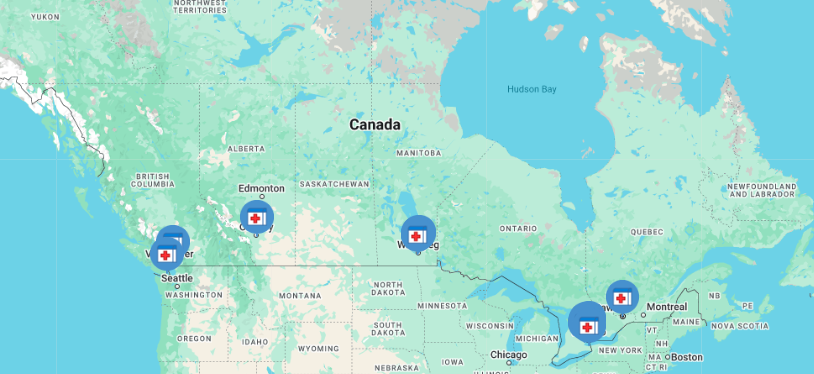GUIDED STRESS MANAGEMENT PATHWAY
This 6-week one-on-one stress program is designed to explore the sources of stress, learn practical coping strategies, and develop long-term tools for emotional resilience. The program combines self-reflection, skill-building, and personalized planning to create lasting, positive change in how stress is handled day to day.
We also offer self-assessment and a library of stress-management resources.
IMPROVE YOUR RESILIENCE
LEARN LIFE-LONG STRATEGIES
REDUCE BODY-STRESS
GET CUSTOMIZED SUPPORT
About the Program

AWARENESS & ASSESSMENT
Begin by identifying key stressors and understanding how stress manifests in your thoughts, body, and behaviors. The therapist will guide you through self-reflection exercises, daily stress logs, and possibly standardized assessments to uncover patterns and triggers. This phase focuses on building awareness and setting specific, realistic goals for change.

COPING SKILLS & EMOTIONAL REGULATION
In this phase, you’ll learn and practice evidence-based coping strategies like cognitive restructuring, mindfulness, and progressive muscle relaxation. The therapist will help you identify unhelpful thought patterns and introduce techniques to manage emotional responses more effectively. Regular check-ins will reinforce the use of these tools in real-life situations.

INTEGRATION & MAINTENANCE
The final phase focuses on integrating new skills into daily life and preparing for future stressors. You’ll develop a personalized stress management plan, including ongoing practices like journaling or breathing techniques. Together with your therapist, you’ll troubleshoot remaining challenges and build confidence in sustaining progress independently.

AWARENESS & ASSESSMENT
Begin by identifying key stressors and understanding how stress manifests in your thoughts, body, and behaviors. The therapist will guide you through self-reflection exercises, daily stress logs, and possibly standardized assessments to uncover patterns and triggers. This phase focuses on building awareness and setting specific, realistic goals for change.

COPING SKILLS & EMOTIONAL REGULATION
In this phase, you’ll learn and practice evidence-based coping strategies like cognitive restructuring, mindfulness, and progressive muscle relaxation. The therapist will help you identify unhelpful thought patterns and introduce techniques to manage emotional responses more effectively. Regular check-ins will reinforce the use of these tools in real-life situations.

INTEGRATION & MAINTENANCE
The final phase focuses on integrating new skills into daily life and preparing for future stressors. You’ll develop a personalized stress management plan, including ongoing practices like journaling or breathing techniques. Together with your therapist, you’ll troubleshoot remaining challenges and build confidence in sustaining progress independently.
Meet Your Therapist
Understanding and managing stress is crucial for maintaining overall physical and emotional
well-being. The impact of stress varies widely; it can cause symptoms like irritability, fatigue,
insomnia, body tension and aches, and difficulty concentrating. Long-term stress can lead to
more serious health problems, such as cardiovascular issues, weakened immune responses, and mental health disorders like depression or anxiety. Techniques like body movement, mindfulness, and seeking support from a mental health professional can help mitigate its effects and improve quality of life.
– Ellie

Ellie Dobreva, RPC
Not sure where to start?
Try a self-assessment.
Our self-assessment is based on the Perceived Stress Scale, a widely used and accepted tool for assessing individual experience of stress and its symptoms. Use of the assessment is anonymous. Our online assessment includes guidance regarding scoring as well as suggested follow-up based on the outcome of the assessment.
Always keep in mind that there are a variety of factors that can influence the reliability of the assessment, that your individual scores may vary over time, and, above all, that it is an assessment rather than a diagnostic tool. As such, this and similar self-guided assessments are not substitutes for professional guidance and should never be considered definitive.
STRESS MANAGEMENT RESOURCES
The following list of resources is provided solely for educational purposes. WELL Mental Health & Wellness is not affiliated with any third-party content providers or sources.
Commonly Asked Questions
What are the common reasons people suffer from stress?
Common reasons for stress include work pressure, financial difficulties, relationship issues, health problems, and major life changes. These factors can overwhelm individuals, leading to heightened feelings of anxiety and unrest.
Can I overcome stress on my own?
While some people can effectively manage stress independently through coping strategies, seeking support from friends, family, or professionals often enhances resilience and provides valuable tools for navigating stressors more effectively.
What other mental health issues commonly accompany stress?
Stress frequently co-occurs with mental health issues such as anxiety disorders, depression, and obsessive-compulsive disorder (OCD). These conditions can exacerbate each other, creating a cycle that complicates treatment and recovery.
Canada's largest network of therapists.
Our diverse network of qualified mental health professionals can support you with many mental health concerns. We believe that excellent client-therapist relationships are crucial for effective support, which is why you can choose your own therapist, and change therapists, at any time.

Supporting you, wherever you are.
As a part of the WELL Health Medical Centre team, we offer in-person therapy at select WELL Clinics. The majority of WELL Mental Health and Wellness services are covered by private insurance and corporate benefits plans.
Available at select WELL Clinics in British Columbia, Alberta, Ontario, and Manitoba.



